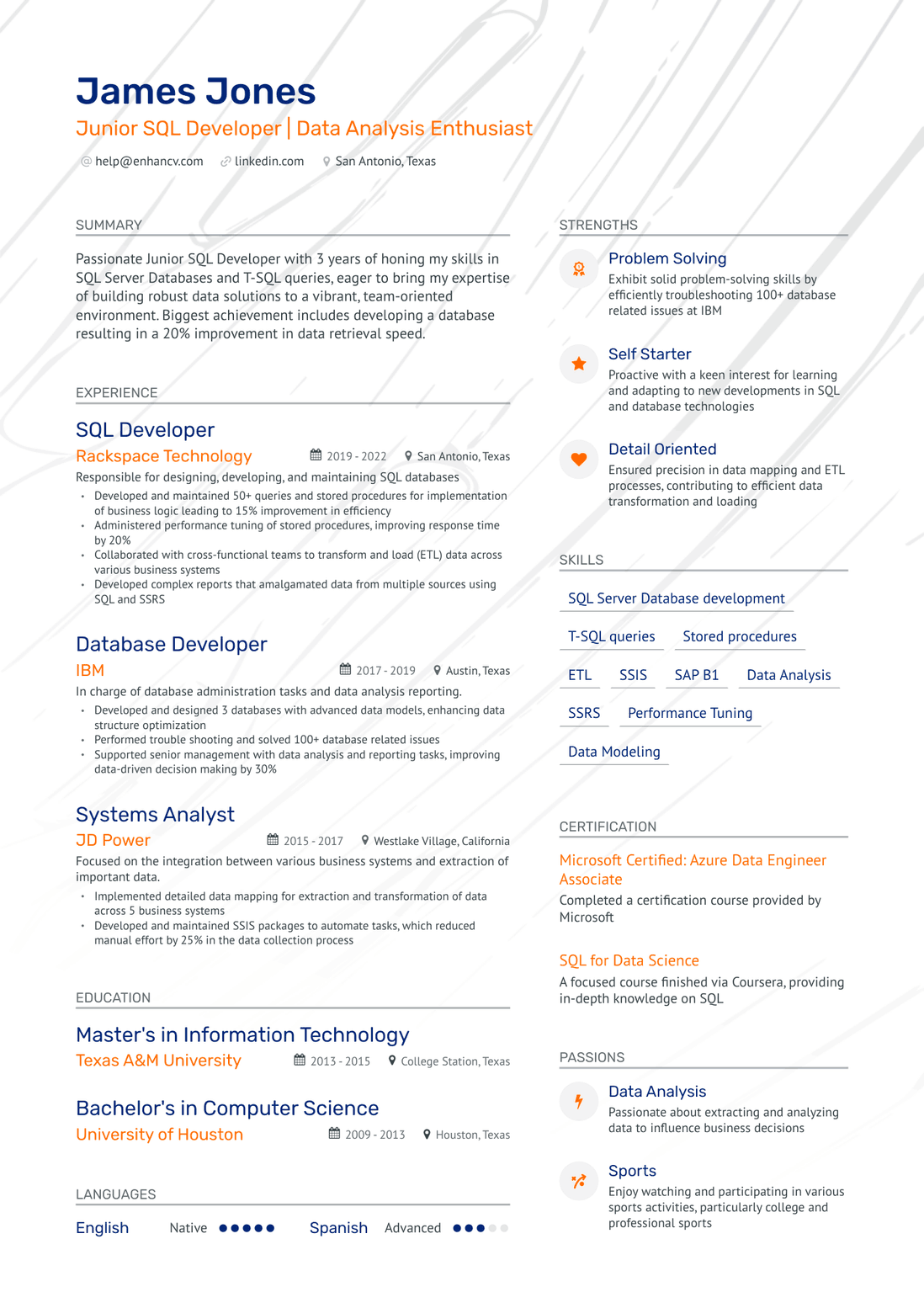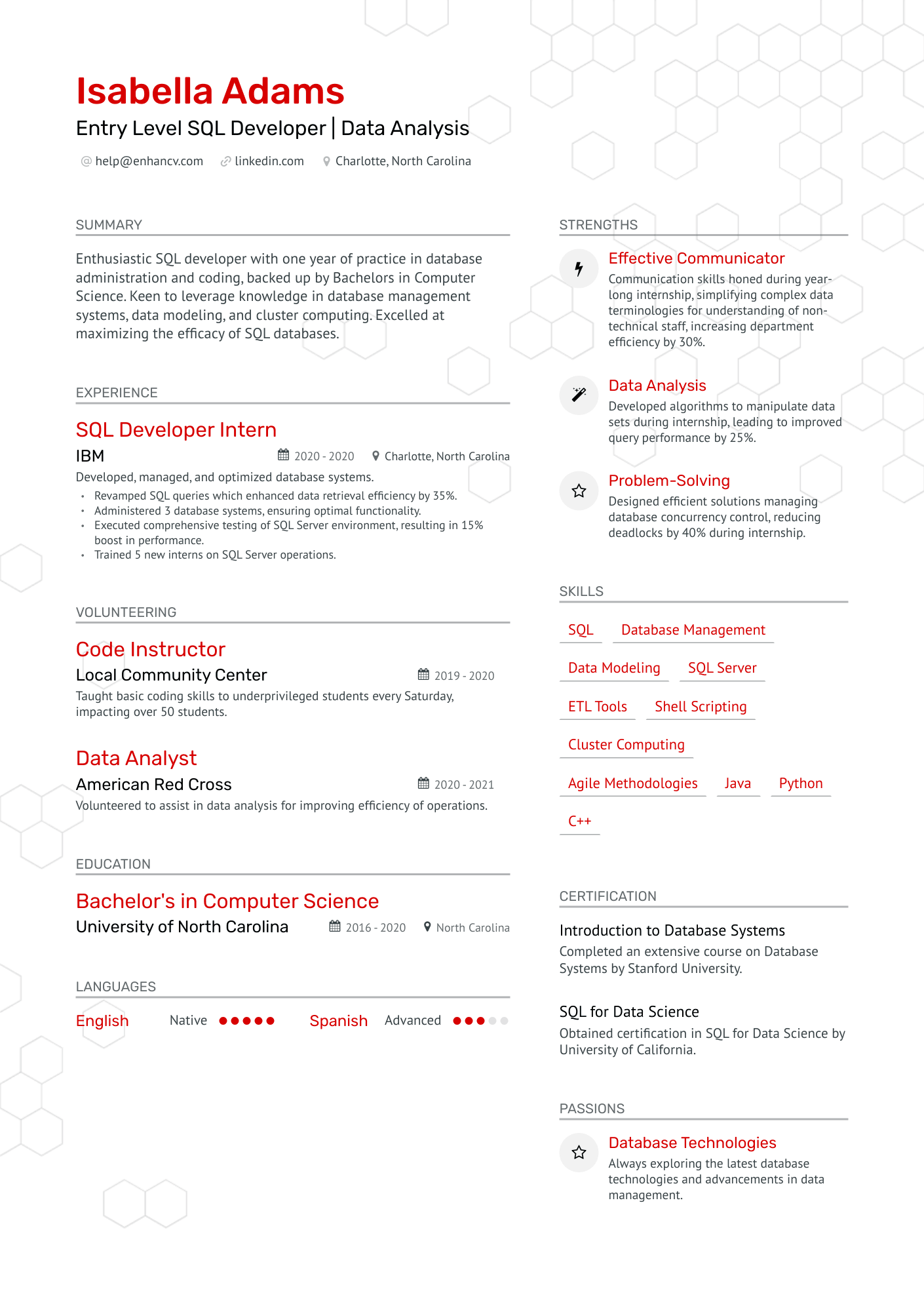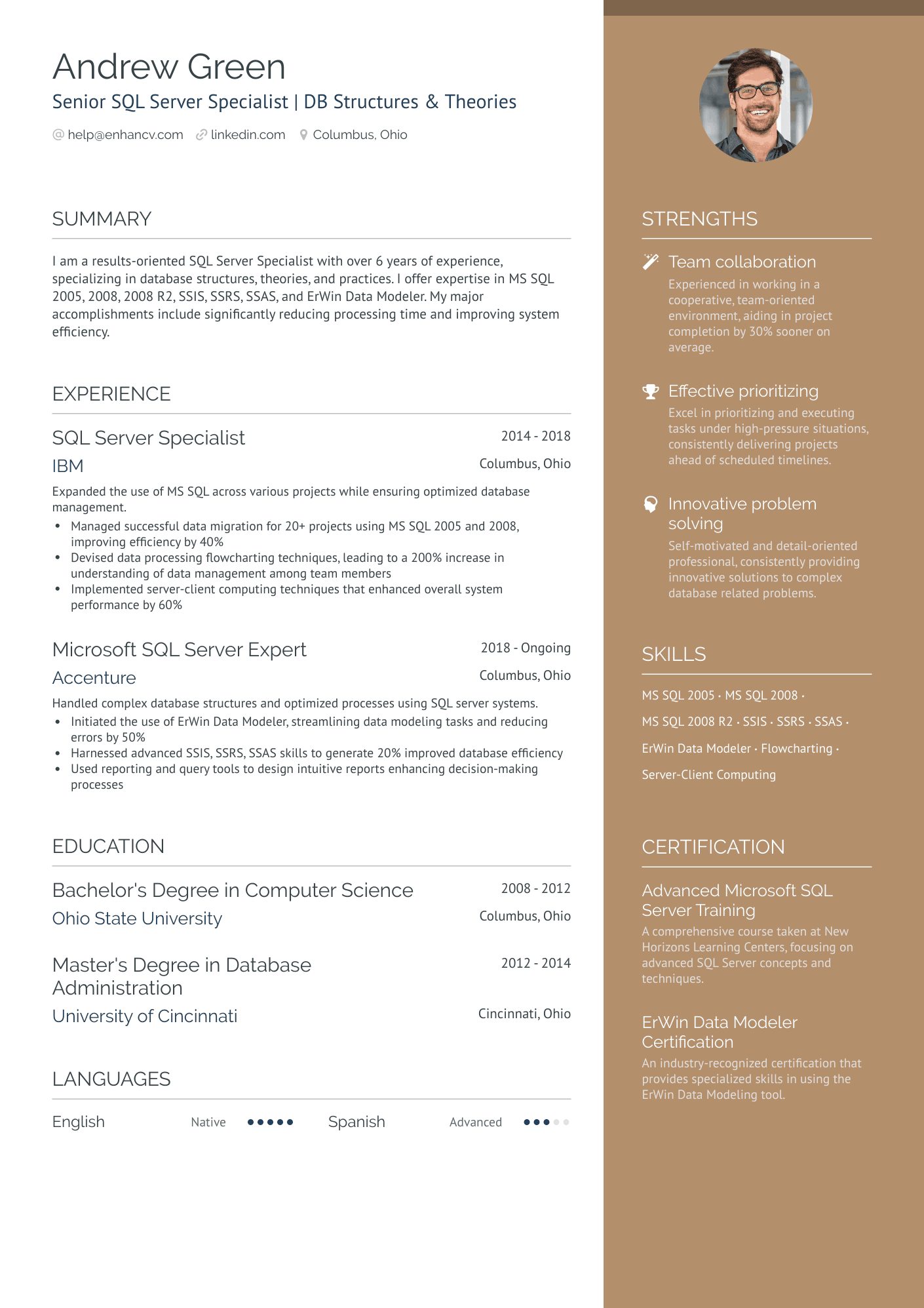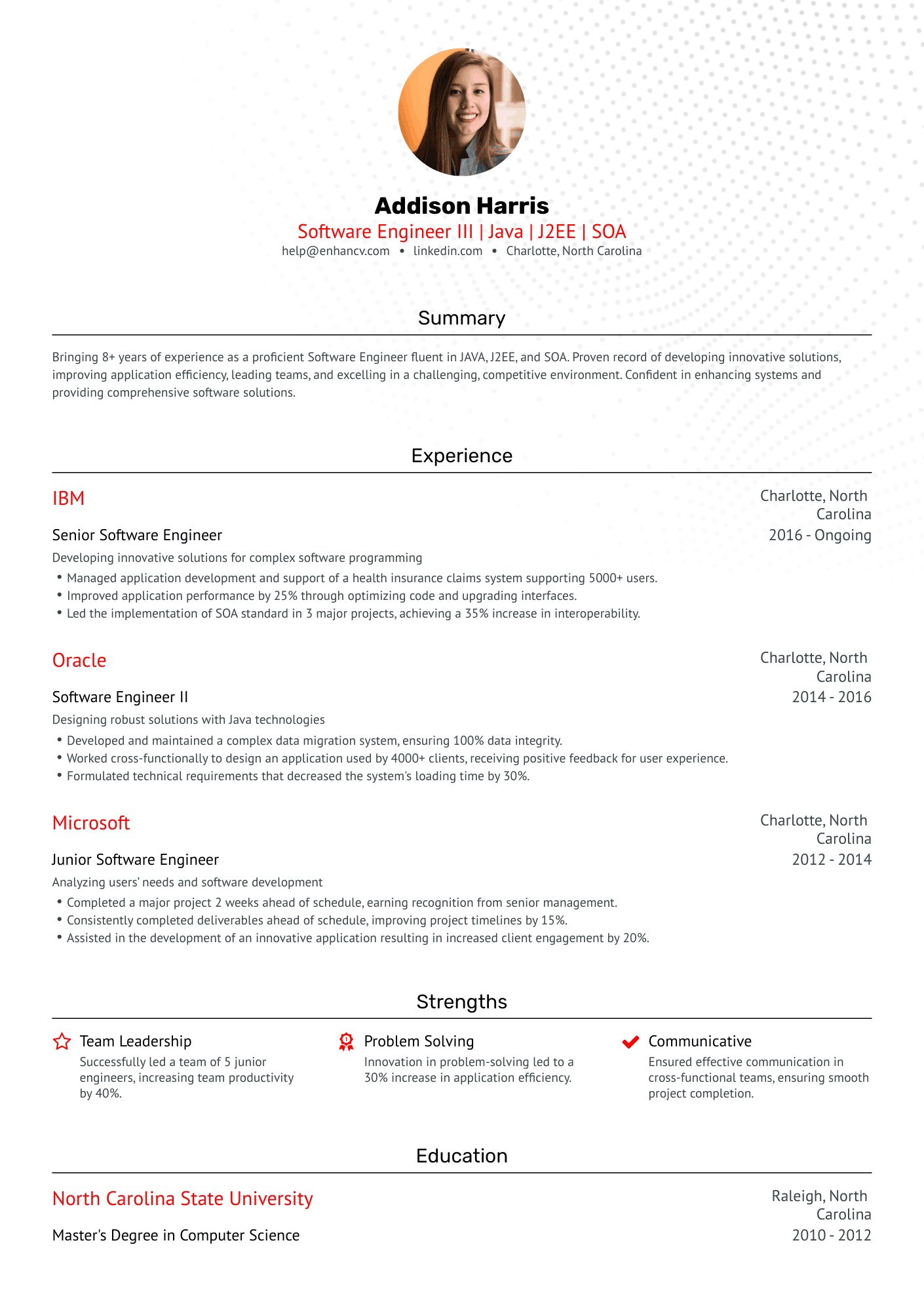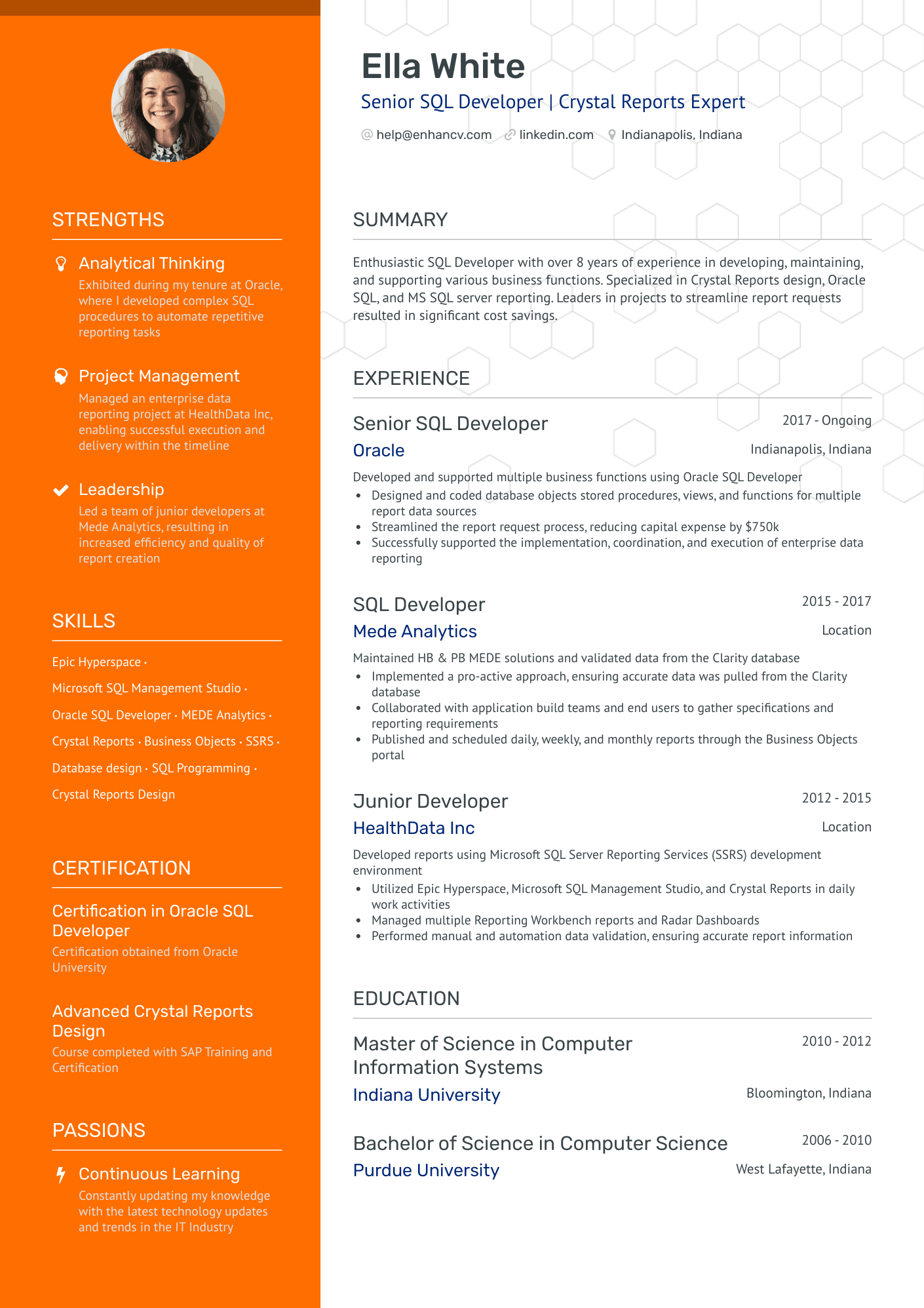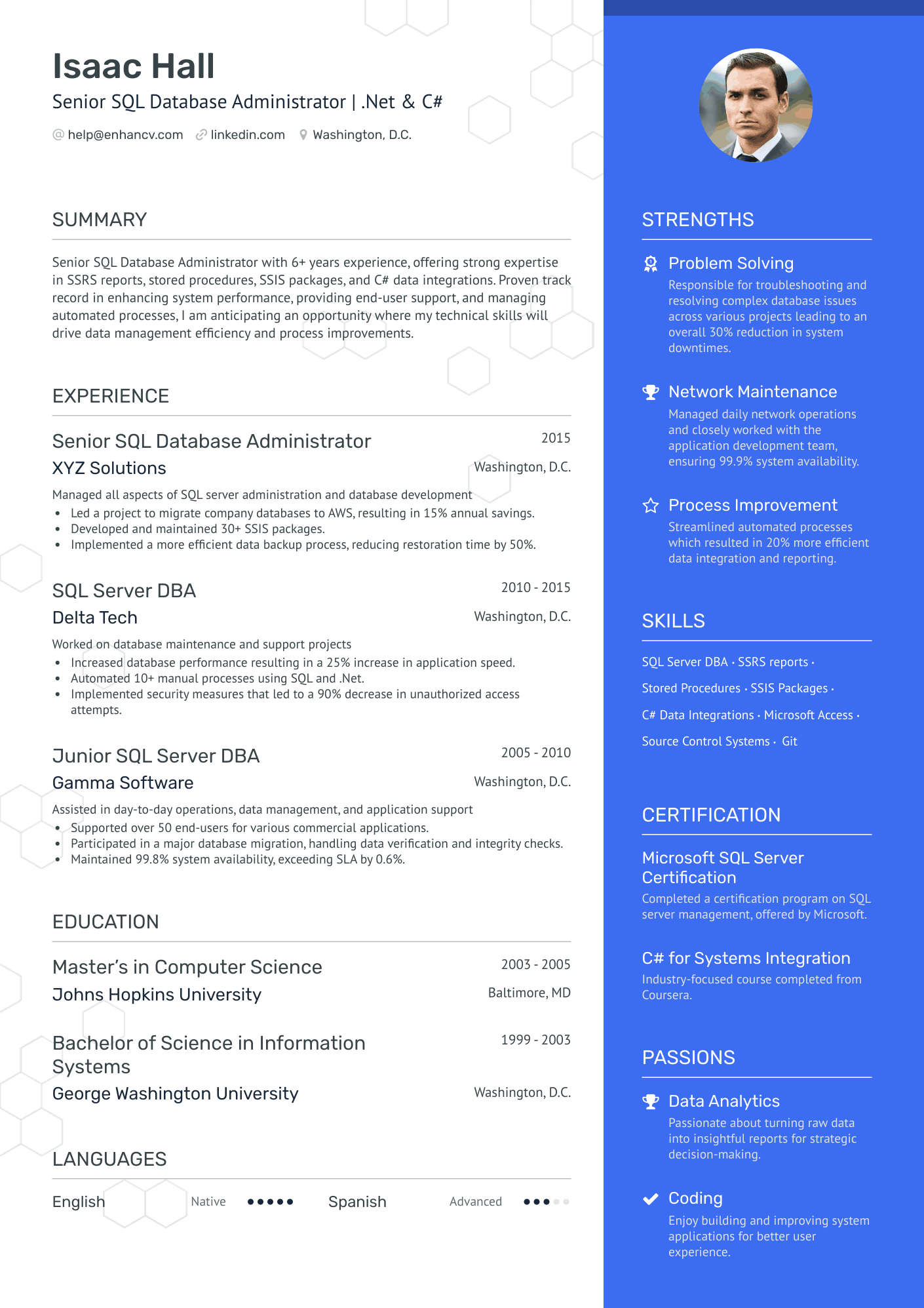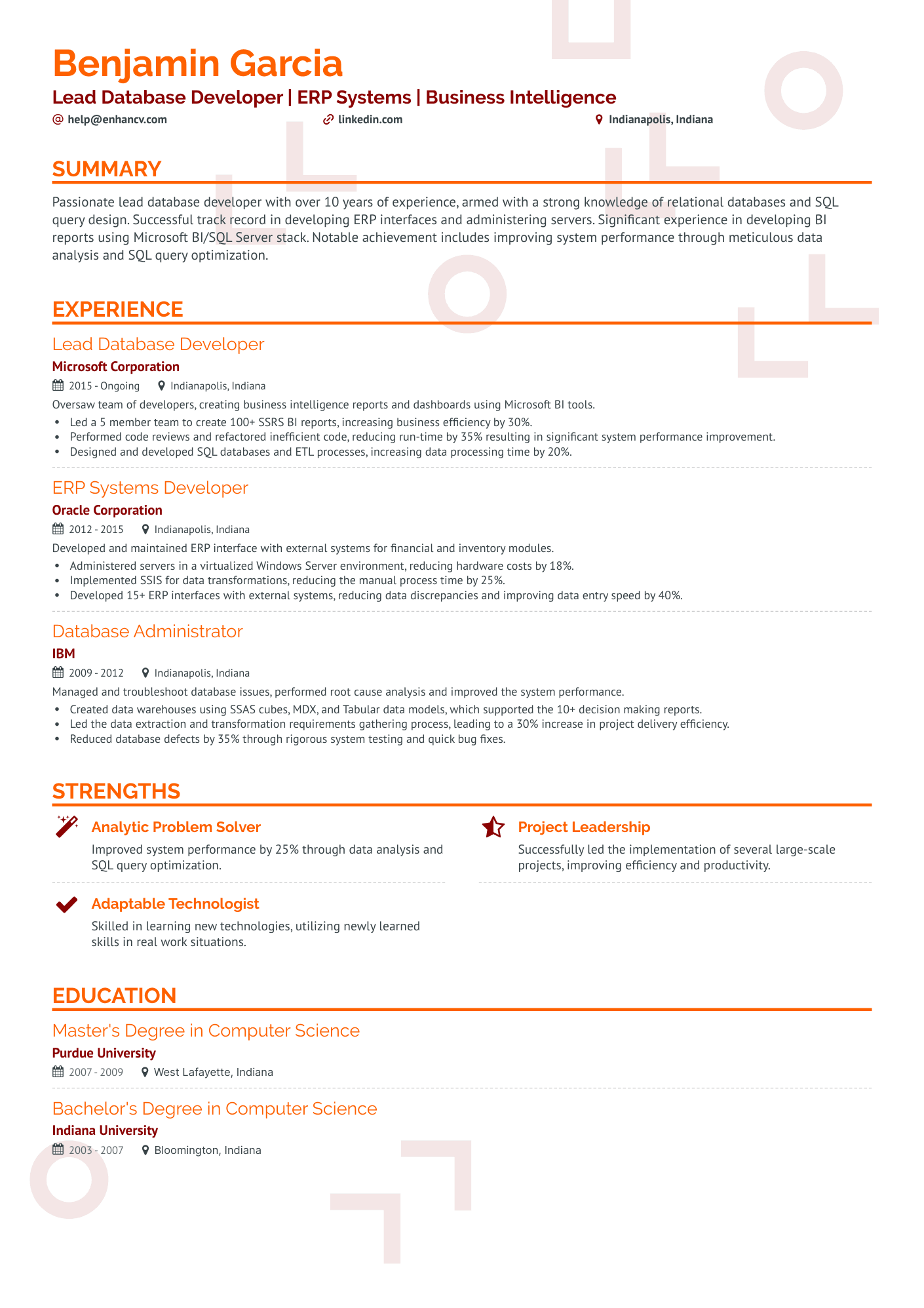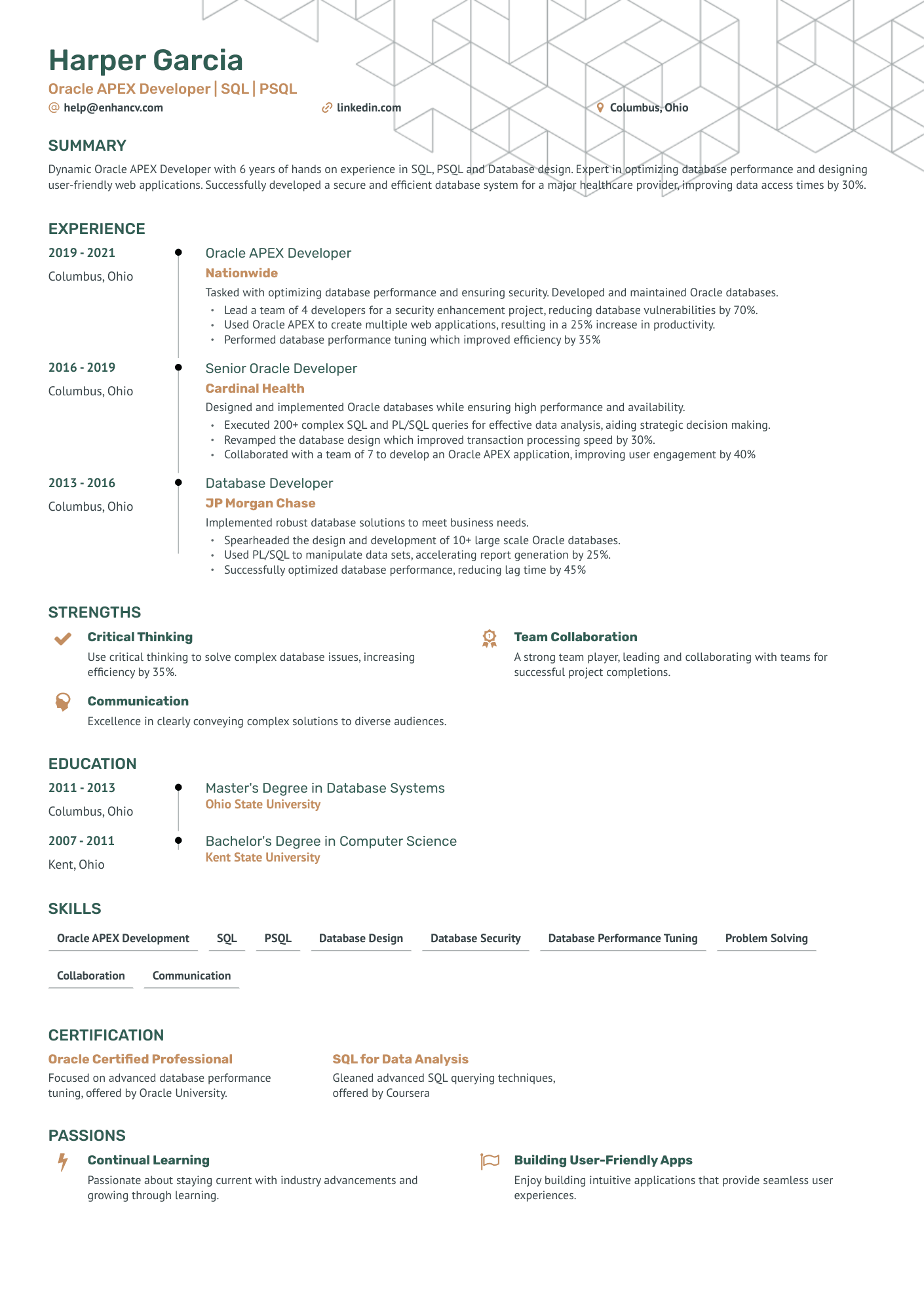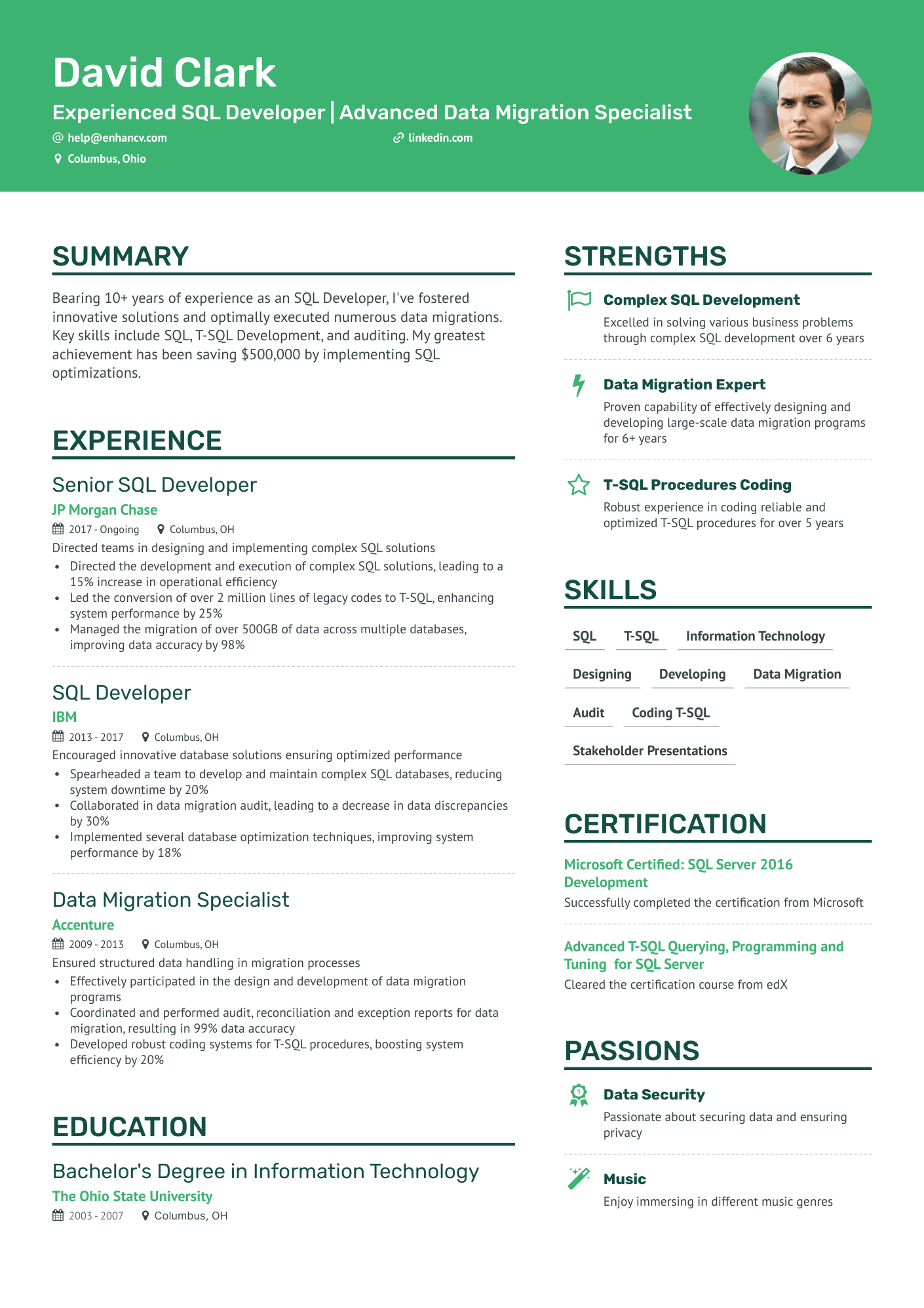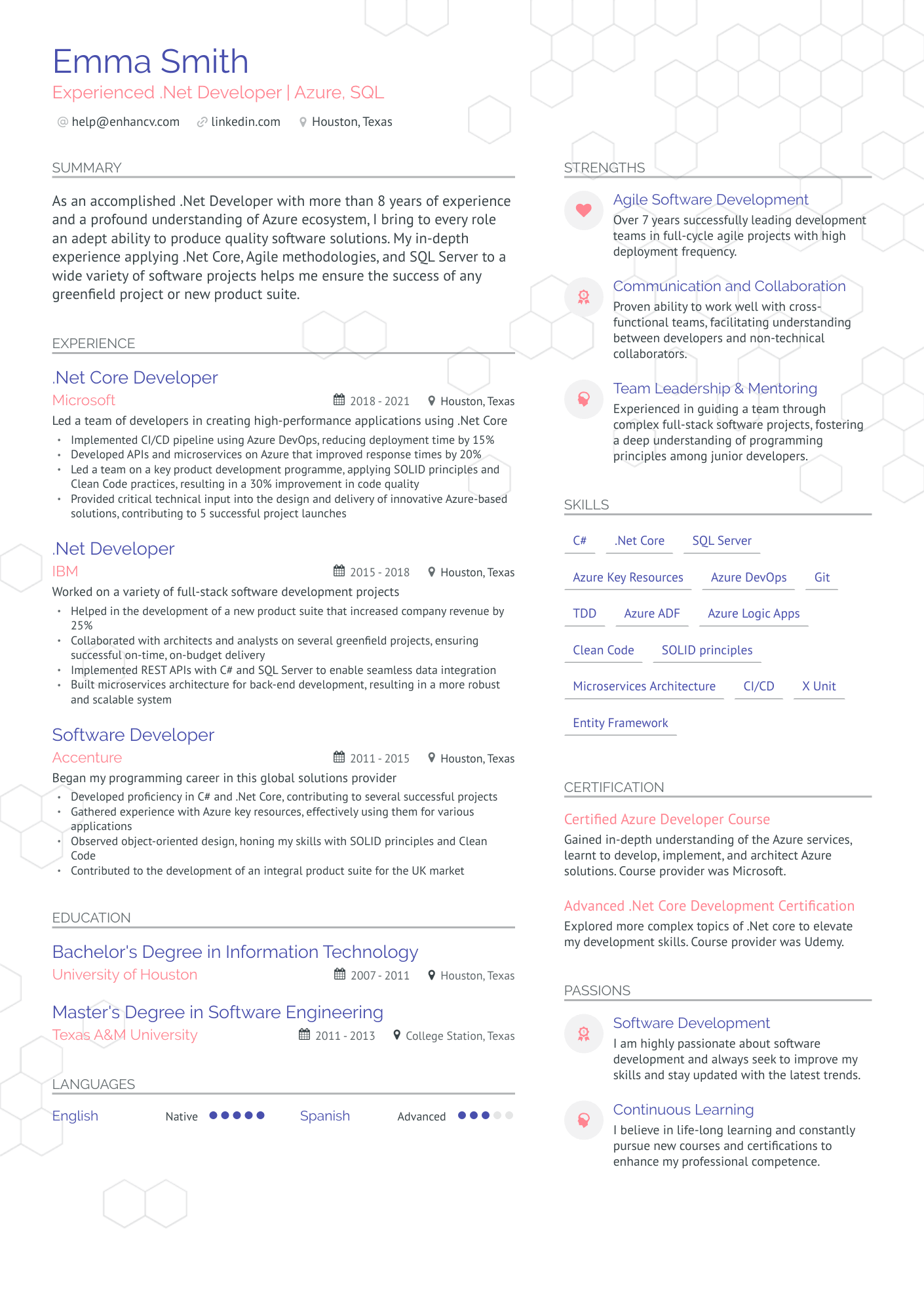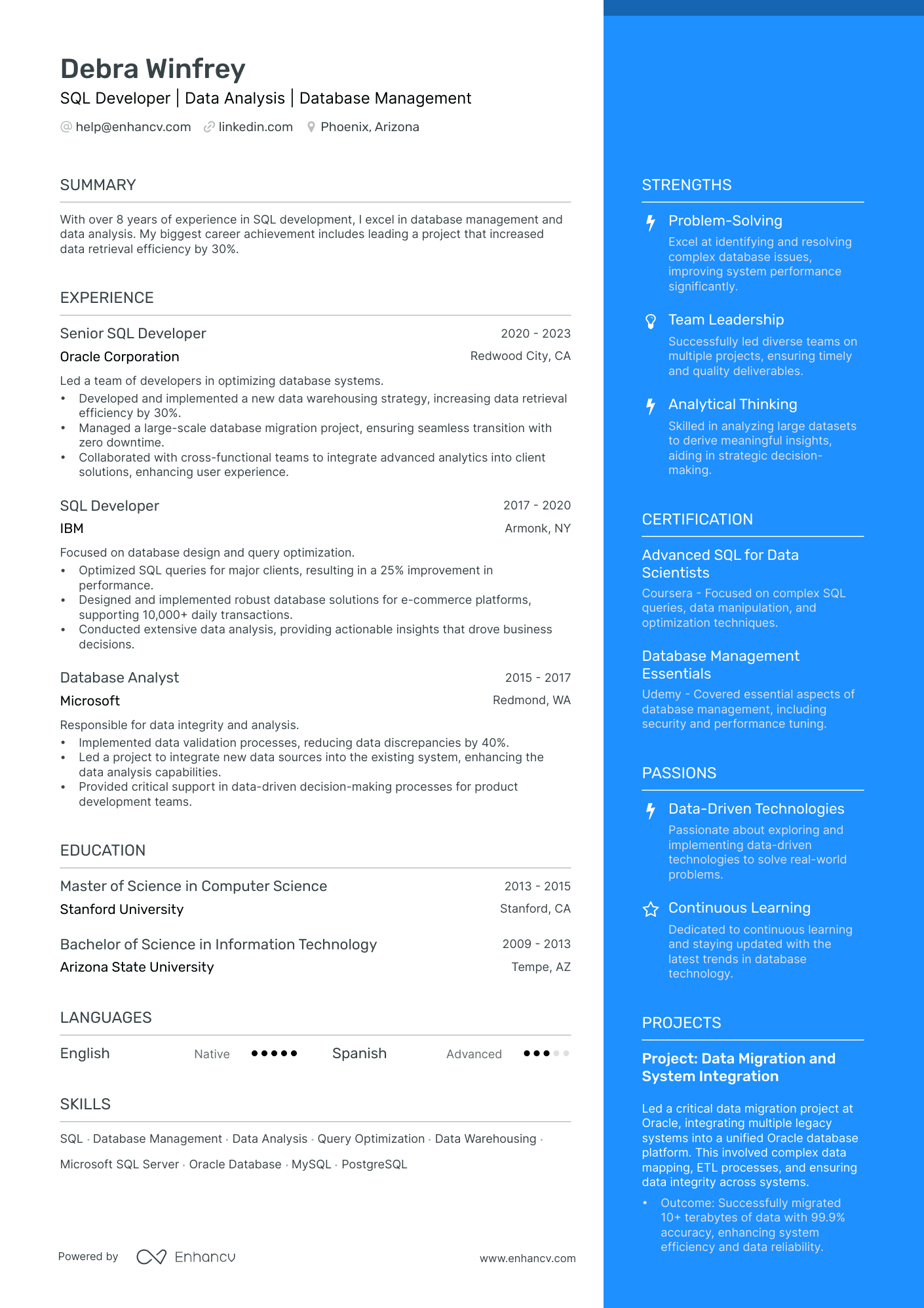Building a job-getting SQL developer resume comes with a unique set of challenges. Because most of the work is done behind the scenes, it can be more difficult to show the quantifiable results that recruiters and hiring managers want to see.
If you are in the market for a new SQL developer position and need to beef up your resume, you’ve come to the right place.
Our resume guide contains all of the information you need to create a professional resume using real-world SQL developer resume samples. We focus on the main issues that SQL developers face when creating their resumes, like adding projects to your resume and highlighting all relatable skills.
In this guide, we will discuss:
- The proper way to format each section of your resume, including the header, summary, work experience, education, and other essential sections
- How to showcase your previous SQL and database work experience using numbers and percentages to show measurable results.
- The importance of adding sections to show certifications, programming languages, and other computer software skills that are relevant to the industry.
- Adding a portfolio of past projects to your resume where recruiters can see the results of your programming.
If you are looking for a programming job in a related field, like Oracle developer or SQL data analysis, check out these resume examples:
- Senior Oracle Developer resume & guide
- Oracle Database Administrator resume & guide
- Database Developer resume & guide
- Database Engineer resume & guide
- SQL Data Analyst resume & guide
- Python Developer resume & guide
Before we get into the nuts and bolts of building a resume for SQL developers, take a look at this resume example.
SQL developer resume example
Looks pretty good, doesn’t it? After reading this resume, you get a clear picture of Debra’s skills and how her work produced positive results that benefited the company.
The two-column, reverse chronological resume format is ideal for candidates with multiple jobs that showcase their related skill sets. The two-column format is best when you need to include a lot of work experience along with relatable skills, certification, and links to portfolio projects.
Here’s what this resume does well:
- Highlighting the Master of Science in Computer Science from Stanford University is crucial. This degree from a prestigious institution demonstrates advanced knowledge in computer science, which is highly relevant for a SQL Developer role.
- Emphasizing the "Advanced SQL for Data Scientists" certification from Coursera is beneficial. It shows specialized skills in complex SQL queries and data manipulation, which are key competencies for this role.
- The experience of leading a project that increased data retrieval efficiency by 30% at Oracle Corporation should be a focal point. This achievement showcases leadership skills and technical expertise in optimizing database systems, vital for a senior role in SQL development.
- Including the project of database migration and system integration at Oracle, where 10+ terabytes of data were migrated with 99.9% accuracy, is important. This project highlights proficiency in handling large-scale, complex data challenges, a critical skill for a SQL Developer.
Now take a look at your resume if you have one started. Does it do the same thing that this example does? If not, don’t worry. We’ll go over how to format your resume and what job-related technical details and additional skills to include.
How to format an SQL developer resume
These days, it is crucial to have a properly formatted SQL developer resume to have any chance of meeting with the hiring team. This is due to companies using applicant tracking systems (ATS) to weed through the hundreds of resumes they receive.
ATS software allows employers to enter specific job-related keywords, titles, skills, and work experience. If the job description includes terms like ‘optimizing MySQL databases’ and you don’t have that on your resume, the chances of getting a high score are poor.
When building your resume, keep in mind the following:
- Use a reverse-chronological format for your resume. This format is the most widely accepted by employers and recruiting agencies. It starts with your most recent work experience and works backward from there, making it easier for them to see your career progression.
- The header section should include your full name, title (SQL Developer with X years of experience), and contact information, like your cell phone, email, and professional social media accounts. Be sure to use a professional email address, such as ‘FirstNameLastName@email.com.’
- In addition to work and education, technical resumes must demonstrate relatable programming and computer skills. You want to list other programming languages and operating software you are experienced with.
- List all related certifications you have earned or are currently working on.
- The standard page count for resumes is 1-2 pages, with one page being the ultimate goal.
- For job seekers with several years of work experience, place the work experience and certification section before your education. You want to show off your best assets first.
- The standard font size for a resume is between 10-12 points.
A quick word about fonts. Applicant tracking systems prefer serif and sans-serif fonts. While Arial and Times New Roman are acceptable, they are a little outdated. Some good-looking fonts for a resume nowadays include Rubik, Lato, Montserrat, Raleway, Exo 2, and Volkhov.
Lastly, when sending your resume to recruiters, save the file as a portable document format type (.pdf). This format will preserve your resume layout and works on all Windows and Mac operating systems.
See how your completed resume stacks up with Enhancv’s resume checker.
The top sections to include on a SQL developer resume:
- Technical skills: Essential for showcasing proficiency in SQL, databases, and relevant tools, vital for a SQL developer.
- Professional experience: Highlights past roles and achievements, indicating practical SQL development expertise.
- Educational background: Demonstrates foundational knowledge, including degrees or certifications relevant to SQL development.
- Certifications and training: Showcases specialized SQL and database skills, enhancing credibility and expertise.
- Projects portfolio: Offers concrete examples of SQL projects, reflecting real-world application and problem-solving abilities.
One of the biggest complaints from recruiters and hiring managers when reading resumes is not being able to see quantifiable results. SQL developers often forget to include how the work they did increased database performance, optimized reporting, and other related data.
What recruiters want to see on your resume:
- Proficiency in SQL and database management systems: Recruiters prioritize candidates with strong SQL skills, essential for managing and manipulating databases effectively.
- Experience with data modeling and database design: Demonstrates the ability to structure and organize data efficiently, a key aspect of SQL development.
- Ability to write efficient, optimized SQL queries: Indicates the candidate's skill in creating queries that perform well, crucial for database performance.
- Experience in data analysis and reporting: Shows the ability to derive insights from data, a valuable skill for businesses relying on data-driven decision-making.
- Knowledge of ETL processes and data integration Tools: Essential for integrating data from various sources, important for managing complex data systems.
Now, we will dive into the main sections of your resume.
How to write your SQL developer resume experience
A SQL developer designs, creates, and maintains databases and is responsible for making sure everything behind the scenes runs smoothly and efficiently. So how do you show what’s not visible?
This is what makes resumes for SQL developers a bit more tricky than other career paths.
The resume experience section is where you will talk about your past work experience that relates to the new job. If the company uses Oracle instead of SQL databases, you want to focus on the work experience where you programmed Oracle databases.
When listing past work experience, include the following information:
- Job title
- Company name
- A brief statement about the company
- Location
- Dates of employment
- Specific details of the job
Take a look at this example of work experience for a SQL developer.
- •Design and implement data quality and integrity processes to reduce data errors and improve overall data accuracy.
- •Develop and maintain reporting and analytics solutions with key insights to increase business revenue..
- •Collaborate with cross-functional teams to develop and maintain processes and improve data consistency across all systems.
Not bad, but it could be much better by adding a little more detail about their work performance.
Did you notice how their experience reads more like a job description? This is a common mistake for SQL developers when detailing past work experience. We see that they have experience with reporting and analytics, but the details lack any evidence of how it benefited the company.
For all we know, it could have made things worse.
Another area for improvement with this resume experience is it does not list the location or what the company does. SQL developers work in a wide range of industries, and recruiters want to see you have experience in the same industry.
Let’s see what happens when you add some more details:
- •Designed and implemented a data quality and integrity process, resulting in a 25% reduction in data errors and improving overall data accuracy by 15%.
- •Developed and maintained a reporting and analytics solution, providing key insights to the business and resulting in a 10% increase in revenue.
- •Collaborate with cross-functional teams to develop and maintain ETL processes, reducing data transfer times by 30% and improving data consistency across all systems.
Much more impressive now, isn’t it? Here’s what this resume experience example does well:
- It includes the location of the company and a brief statement about what they do.
- It uses actionable words like ‘designed and implemented’ vs. ‘design and implement.’
- It shows how their work increased revenue using percentages and numbers.
- It uses industry-specific keywords, like ‘ETL processes’ that applicant tracking systems look for.
This is the kind of resume experience recruiters want to see and what you should aim for when adding your past work experience. You want to focus on how your work improved the company’s backend performance and not simply rewrite the job description.
One final word about adding work experience to your resume. Do not assume the person reading your resume understands technical terms. If you flood your resume with too much technical jargon, it may hurt your chances of getting an interview.
How to quantify the impact on your resume
Saying your SQL queries and database optimization scripts work well is one thing. Demonstrating how they achieved quantifiable results is another.
Recruiting departments want to see numbers and percentages that show how your SQL queries and processes can benefit them.
If you created a process that increased query performance times, optimized database accuracy and reliability, or shortened XML file lengths, point it out. Include exact numbers that show the increase in performance or a reduction in processing times to show recruiters how they can benefit from your masterful SKL skills.
Here are some examples of how to quantify the impact of your resume:
- Include the number of databases you managed – “Managed and maintained 15 individual store databases with a focus on improving inventory control.”
- Mention specific data sizes to demonstrate you can handle large volumes of data – “Managed MSSQL database of up to 100TB.”
- Quantify performance improvements in SQL queries you optimized – “Increased database performance by 13% using optimized SQL queries to limit the amount of data they return.”
- Include the number of data integration projects you completed and their results – “Oversaw 47 data integration projects that incorporate data from new stores without affecting overall database performance.”
- Detail any reduction in data retrieval times using percentages and numbers – “Improved data retrieval times by adjusting database access and indexing strategies, which reduced the lag time by 5%.”
- List the number of reports and dashboards created – “Created 30 transactional reports that analyze sales data from each location along with 10 dashboards to show key metrics for 100+ stores based on region and store location.”
- Detail any data migrations or improvements to the database – “Oversaw the migration of company database from MySQL to PostgreSQL to increase query optimization, support more data types, and adhere more closely to SQL standards.”
- Focus on any increases in data accuracy and reliability– “Designed and implemented a data warehouse solution, resulting in a 40% improvement in data accessibility and a 25% reduction in reporting time for business stakeholders.”
Having little to no SQL developer experience doesn’t mean you shouldn’t go after that dream job. Next, we will go over how to add relevant work experience to your resume.
How do I write a SQL developer resume with no experience
For those of you who are searching for your first SQL developer role, you can include relatable work experience that showcases your programming and database skills and passion for managing and analyzing data.
Every high-paid SQL developer once stood in your shoes, anxious to find their first developer role.
Follow these tips for creating a SQL developer resume with no experience:
- Highlight your education first, as you want to show them you have the necessary hard skills for the position.
- List any internships, freelance work, or volunteering where you used your SQL skills, including the programming or web development languages used, and any quantifiable results from the queries and processes you created.
- Showcase your advanced technical skills by listing any certifications you have earned or are currently working on.
- Indicate which programming languages you are familiar with along with your proficiency level
- Include any personal hobbies that point to superior problem-solving skills, like playing chess, solving mystery rooms, and strategic gameplay.
Another key section of your resume for SQL developers with or without experience is your hard and soft skills.
How to list your hard skills and soft skills on your resume
All jobs will have a set of specific hard and soft skills that should be on your resume. The trick is knowing which ones to highlight for the specific job.
- Hard skills – These are the skills you learn at school and through on-the-job training. They include necessary skills like, ETL processes, writing various programming and web application languages, and database design and optimization.
- Soft skill – This section lists the natural skills you learn through various life experiences at home, school, and work. They include valuable skills like analytical thinking, adaptability, and showing resilience under pressure.
When listing your technical skills, you want to list those skills that are included in the job description first. That way, applicant tracking systems will give your resume a high score.
Also, keep in mind that the hard and soft skills applicant tracking systems look for are a specific set of keywords entered by the recruiting team. You need to make sure your hard and soft skills match those listed in the job description precisely.
If the job description says “multi-technology database architecture” and your resume says “Tier 1-3 database architecture types,” the software will not recognize it as the same thing.
Best hard skills for your SQL developer resume
- SQL and T-SQL programming
- Database design and normalization
- Performance tuning and query optimization
- Data modeling and warehousing
- ETL (Extract, Transform, Load) processes
- Reporting and analytics
- Microsoft SQL Server Management Studio (SSMS)
- Oracle Database
- PostgreSQL
- MySQL
- NoSQL databases like MongoDB
- Stored procedures and triggers
- Database security practices
- Backup and recovery methods
- Data migration and integration
- Familiarity with BI tools like Tableau or Power BI
- Knowledge of Python or R for data manipulation
- Version control systems like Git
- Agile and Scrum methodologies
- Cloud platforms like AWS RDS or Azure SQL Database
Best soft skills for your SQL developer resume
- Analytical thinking
- Problem-solving
- Attention to detail
- Effective communication
- Teamwork and collaboration
- Time management
- Adaptability
- Creativity in solution design
- Critical thinking
- Patience and perseverance
- Learning agility
- Customer focus
- Project management
- Leadership skills
- Emotional intelligence
- Negotiation skills
- Conflict resolution
- Decision-making
- Resilience under pressure
- Cross-functional collaboration skills
How to list your certifications and education on your resume
Whether you are fresh out of college or have ten years of SQL experience under your belt, you will need to list your education and any certifications you’ve earned.
Employers want to see that you have learned the fundamentals of programming languages and have the necessary hard skills that universities and technical schools provide. When listing the degrees earned, use the following format:
- Degree name
- Name of the school
- Dates of attendance
- Location
- Your GPA
Here is an example of how your education section should look like:
When listing your certifications, it is best to place it underneath the education section. List the following information for each certification:
- Certification type
- Name of the institution
- Year completed, if applicable
It should look something similar to this example:
Another good way to highlight a certification is by including it in the header section at the top of your resume. In the job title, you can list a specific certification if it relates to the job:
Best certifications for your SQL developer resume
How to write your SQL developer resume summary or objective
Underneath the header section you will write a brief summary or objective that tells employers why you are applying and what makes you the ideal candidate for the position. Which one is right for you? That depends on your work experience.
A resume summary is for job seekers who have three or more years of experience and are ready to move to a more advanced position within the same career path. It is a short, 3-4 sentence summary of their work experience and how it will relate to the new position.
Let’s take a look at a couple of examples of a resume summary for a SQL developer:
Not bad, but it can be a lot better by adding some more specifics. This is your chance to show off your writing skills and passion for database design.
From this summary, we pick up what industry he has experience in along with specific programming skills and languages used. It includes keywords that ATS software looks for, like SQL, Python, and ‘optimizing database performance.’
A resume objective is for those with little work experience and looking for their first job in a new industry. They focus more on education and relatable skills and the person’s desire to work as a SQL developer. This section should be no more than three sentences.
Here’s an example of a resume objective section:
This example is pretty cookie-cutter and doesn’t grab the reader's attention, which is what you want to do. Let’s try revamping it a little.
With just a few more details, we turned that drab resume objective into something that makes recruiters put your resume at the top of the pile.
Additional sections for an SQL developer resume
You want your resume to showcase all of your best skills for the job. In addition to work experience, education, and certifications sections, you may also consider adding some additional sections to your SQL developer resume.
The best sections for a SQL developer are:
- Computer Software – You can list additional software you have experience with, such as PostgreSQL, Azure Data Studio, Oracle SQL developer, Microsoft SQL Server, and tracking and reporting software.
- Programming languages – You can further impress recruiters by listing all of the relevant programming languages you are familiar with, like Java, C#, Python, and Power BI.
- Professional associations – A smart SQL developer will be a member of a local or national networking group or professional association. You can add a section for these to show how well-connected you are with others in the industry.
Finally, we will go over how you can let recruiters see some of your SQL queries and processes in action.
Adding an online portfolio to your SQL developer resume
An online portfolio is a way you can let hiring teams see some of your queries and processes at work. There are several ways that you can do this.
A personal website is a great way to show off your programming skills along with your web programming skills and creativity.
If you don’t want to spend time building and managing a website, there are several online portfolio sites where you can share your work. Some of these sites include:
- Github
- Tableau Public
- Behance
- Dribble
- Adobe Portfolio
Key takeaways
Building an attention-getting SQL developer resume is essential for landing your dream SQL developer position for any experience level and position.
When crafting your resume, remember these crucial tips:
- Properly format your resume so that applicant tracking systems approve it and give you a higher score.
- Highlight your quantifiable results by using numbers and percentages while describing your work experience.
- Include keywords from the job description that describe your experience and skills.
- Match your hard and soft skills to the job description precisely.
- Include relevant skills, programming languages, and computer software to further highlight your experience.
SQL Developer resume examples
Explore additional sql developer resume samples and guides and see what works for your level of experience or role.
By Experience
Junior SQL Developer
SQL Developer Entry Level
Senior SQL developer
By Role
